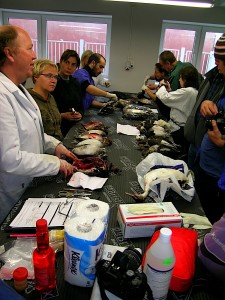
In an emergency response, the single most important determining factor for a successful outcome is cooperation. Key response specialists should not waste their time or energy on lengthy discussions or perform in mistrust of one another. By working on the same page, their efforts are bound to be successful, even under the most difficult of circumstances.
Sea Alarm’s philosophy therefore is to connect people long before they may have to work together as part of a wildlife response
National activities
Sea Alarm has organised national workshops and round tables in many European countries, liaising with a national group and often including the authorities responsible for oil spill or oiled wildlife response. Workshops examine the various challenges of a marine wildlife emergency and the different response approaches they require.
As a independent facilitator, we can help to create an open and cooperative atmosphere in which possible problems are identified and addressed before they may compromise a response. Our involvement in so many different countries provides us with valuable experience and insight, enabling us to provide better assistance to national stakeholders in their attempts to prepare for a marine wildlife emergency.
Regional activities
Integrating wildlife response into existing regional programmes
Countries within a regional sea area have to deal with the same environmental characteristics of that sea and often share the populations of wildlife that are vulnerable to marine pollution. In Europe, these countries have concluded Regional Agreements that facilitate mutual assistance to prevent, prepare for, and respond to marine pollution, as a practical elaboration of the International Convention on Oil Pollution Preparedness and Response and Cooperation (OPRC).
Ideally, wildlife response forms part of individual countries’ marine emergency planning. Through its contribution to the technical meetings of these Agreements, Sea Alarm works to encourage and facilitate cooperation between countries and consider planning for wildlife response at a regional level. Our support aims to have wildlife response recognised as an integrated part of the overall pollution response planning and cooperation by the Contracting States of these Regional Agreements.
Helsinki Convention
Bonn Agreement
Sea Alarm attended several earlier OTSOPA meetings to report on its activities and international developments, leading to a recognition of the importance of wildlife response and agreement that it should form part of the reporting obligations. The EUROWA network (coordinated by Sea Alarm) is an observer to the Bonn Agreement and has played an important role in the adoption of a chapter on oiled wildlife response in the Counter Pollution Manual.
Barcelona Convention
Under the Barcelona Convention, Sea Alarm holds an MoU with REMPEC, which facilitates Sea Alarm’s advisory role as part of the Mediterranean Assistance Unit (MAU) to individual Contracting Parties and its involvement in future wildlife incidents.
Worldwide perspective
Scientific community

Sea Alarm aims to build dedicated networks of marine population scientists and identify priority projects that facilitate the availability of knowledge and scientists in the aftermath of incidents. A EUROWA training course package and manual is available.
Responder networks
Sea Alarm is connected to an international network of oiled wildlife responders including leading organisations with extensive oiled wildlife response experience. Sea Alarm aims to facilitate cooperation between these organisations where needed, notably in Europe, in order to exchange experiences, identify standards of good practice, develop training models and training opportunities, and facilitate international responses, when necessary.
 Sea Alarm formalised the cooperation between European NGOs via the EUROWA initiative, to provide an infrastructure that supports preparedness and response activities at national, regional and international levels. Sea Alarm holds the secretariat of the EUROWA network and has been instrumental in coordinating its activities and evolution. Learn more about EUROWA.
Sea Alarm formalised the cooperation between European NGOs via the EUROWA initiative, to provide an infrastructure that supports preparedness and response activities at national, regional and international levels. Sea Alarm holds the secretariat of the EUROWA network and has been instrumental in coordinating its activities and evolution. Learn more about EUROWA.
As part of Sea Alarm’s cooperation with the oil industry, Sea Alarm has played an important role in building a global response capacity with leading wildlife response organisations via the Global Oiled Wildlife Response System. GOWRS is now a live service available to industry (via Oil Spill Response Limited) and other stakeholders.


